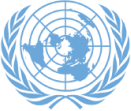SIXTY-NINTH SESSION OF THE UN GENERAL ASSEMBLY
THIRD COMMITTEE
8 October 2014
New York
STATEMENT BY AMBASSADOR OCHIR ENKHTSETSEG
REPRESENTATIVE OF MONGOLIA
/On Agenda Item 26 - Social Development/
Madame Chair,
Let me begin by extending my delegation’s heartfelt congratulations to you and other colleagues in the Bureau on your unanimous election. We are confident that under your skillful leadership, our Committee will have fruitful deliberations. I pledge my delegation’s full support and cooperation in the discharge of your onerous responsibilities.
My delegation associates itself with the statement made by the distinguished representative of Bolivia on behalf of the Group 77 and China.
Madame Chair,
Two weeks ago at the General Debate, the world leaders reiterated their determination to place the eradication of poverty and hunger at the core of the post-2015 development agenda. It has been increasingly recognized that this agenda will be underpinned by sustainable development based on effective and balanced integration of its three pillars – social, economic and environmental. However, the concern expressed in the Secretary-General’s report (A/69/157) that to date, economic and environmental concerns have largely overshadowed the social dimension, ought to be addressed as we embark on the intergovernmental negotiations on SDGs during this session of the General Assembly.
Promoting empowerment of people in achieving poverty eradication, social integration and full employment and decent work for all is a pressing issue of social development. The Secretary-General rightly noted in his report that the process of empowerment can accelerate the achievement of the MDGs and support a post-2015 development agenda in realizing more inclusive, equitable, and sustainable development.
Empowerment is a multifaceted process requiring, inter alia, investing in essential social services and social protection, improving access to decent work and other productive assets, promoting open and inclusive institutions, transparency and accountability, respect for human rights and impartial justice system.
Here, my delegation would like to highlight some national efforts aimed at empowering people through increased public participation, ICT development, better access to decent work and education measures.
To ensure an inclusive growth and citizen’s participation a national policy on decentralization through direct democracy has been introduced. As a result, citizens have been enabled to directly participate in identifying development priorities and allocation and monitoring of the local budget.
A Standing Committee on Petitions was set up in the Parliament.
To enhance civic participation in policy development and decision-making, the “Citizens' Hall’ - public hearing practice was introduced. The Hall encourages citizens to voice their opinion on pending legislation and is open to any citizen. Local Citizens’ Halls have been opened in all administrative units across the country. Since its opening back in 2009, discussions of 375 draft laws and decisions pending before the national Parliament were held in the Citizens’ Hall and opinions of 17,675 citizens were sought.
Government has set up a hot-line center “11-11” that enables direct contact with people, by receiving and solving citizens’ petitions. To deliver an efficient public service and cut the red-tape 78 units of public service online machines were installed in municipal districts.
An extensive judicial reform is underway.
Madame Chair,
My delegation fully shares the view that nowadays, social development and empowerment are impractical without information and communication technologies.
Today in Mongolia citizens enjoy free access to affordable broadband services regardless of residing locations. Mobile phone networks covering 90 percent of the country's vast territory have more subscribers than the country's own population.
Radio and television broadcasting has been recently switched over from analogue to digital technology and e-signature project is underway.
At global level, we are proud of chairing the Freedom Online Coalition - an intergovernmental organization consisting of 23 member countries committed to advancing Internet freedom. In this regard, my delegation wishes to invite fellow members to join the coalition and participate in its next conference to be held in Ulaanbaatar in May 2015.
In order to address the persistent unemployment lingering at 7-10 percent level over the past few years, the Government has been focusing on introducing a decent work policy. A sound initiative under this policy is the national programme "An Employed Mongolian with a Job and Income" aimed at creating 150 thousand workplaces. The program envisages also implementation of special measures to support labor rights and small-and-medium scale enterprises and target employment of people over 40 years old, young herders and persons with disabilities.
Since the launch of the programme, some 34 thousand jobs were created, a number of unemployed middle-aged and young people were provided with vocational training and other necessary skills. Furthermore, public and private employment agencies have been consolidated through the newly-established Labor Market Integrated Network.
However, we are cognizant that our employment policy needs to be further streamlined to involve opportunities for work that is productive and delivers a fair income, security in the workplace and social protection for families, better prospects for personal development and social integration.
Madame Chair,
Education is an important pillar of social development and a critical tool for empowerment. Mongolia has been active in promoting education and literacy efforts both at home and at the international level, the latest being the UN Literacy Decade (2003-2012). The Decade advanced, inter alia, an expanded vision of literacy as a foundation for further learning across the lifespan and underscored its importance as a development imperative.
In spite of steady progress in the global literacy landscape, it remains an enduring challenge with varying results across regions and countries. Although three quarters of the world’s non-literate adult population live in developing world, low literacy skills are also a concern in many high-income countries. Women make up two thirds of the world’s non-literate population.
Me delegation supports the five strategic axes proposed in the SG report to scale up literacy action worldwide following the Decade, including through a country-driven, community-owned and collaborative multi-stakeholder partnership.
At the national level, we had been strongly committed to achieving the Decade goals within its four expected outcomes and six key areas for action. They have been integrated into the country’s strategic development policies, including the National Education Program (2010-2021). A particular attention has been accorded to establishing an enabling environment to prevent school dropouts and promote literacy education for all, prevent reoccurrence of illiteracy, promote life-long learning and self-development of people.
We also support the DG’s recommendation to consider integrating literacy into the post 2015 global development and education agenda. This and other relevant recommendations will be reflected in the draft resolution entitled "Literacy for Life: Changing Future Agendas" to be tabled by my delegation this year. We look forward to its constructive and positive consideration by this Committee.


